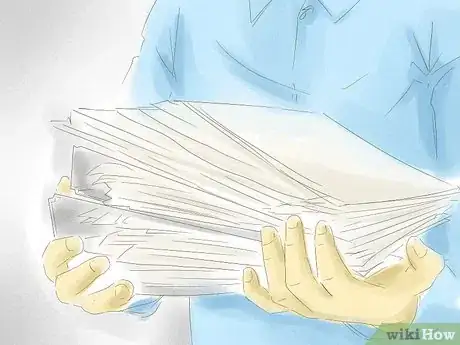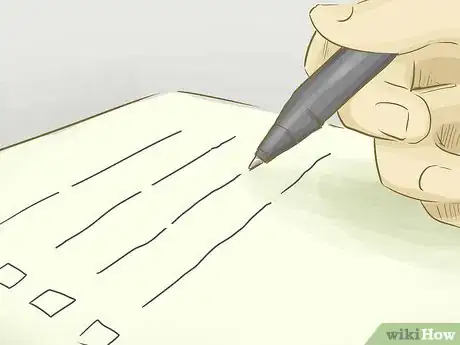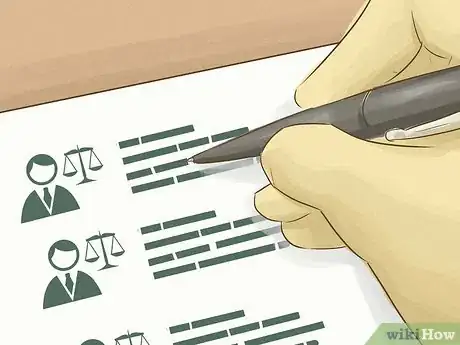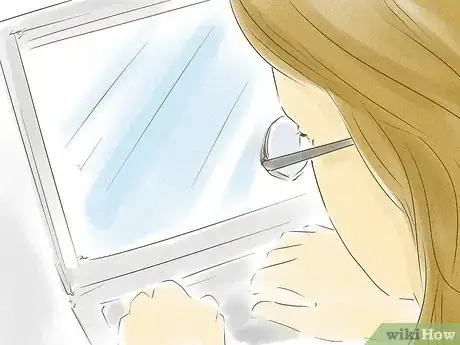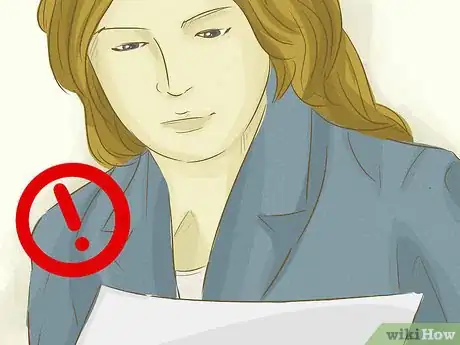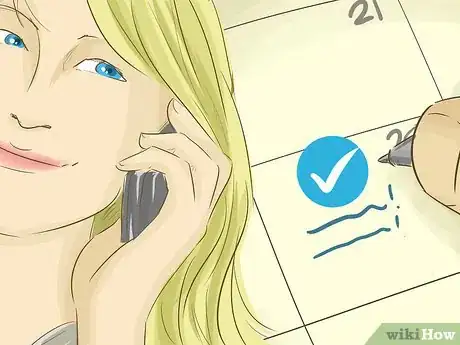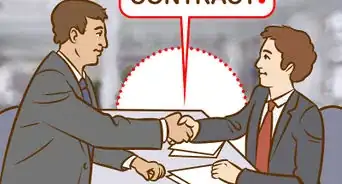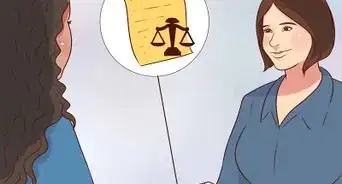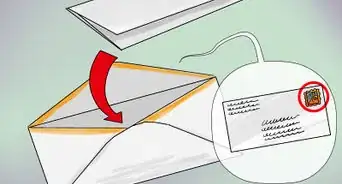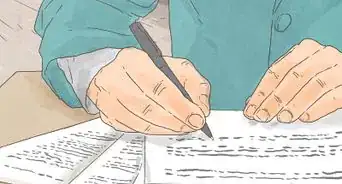This article was co-authored by Clinton M. Sandvick, JD, PhD. Clinton M. Sandvick worked as a civil litigator in California for over 7 years. He received his JD from the University of Wisconsin-Madison in 1998 and his PhD in American History from the University of Oregon in 2013.
There are 11 references cited in this article, which can be found at the bottom of the page.
This article has been viewed 41,472 times.
Personal injury occurs when you are hurt through someone else's actions. The injury can be physical (like a car accident) or emotional (like slander or death of a loved one).[1] When you approach the court or the insurance company for a financial award to compensate you for your damages, you'll need a good personal injury lawyer on your side. But not all plaintiff's lawyers are created equal. Don't fall for the first television commercial. Do your homework and find the right personal injury attorney for your case.
Steps
Beginning Your Search
-
1Understand the benefits of a qualified lawyer. Personal injury is a specialized area of law. Even though an attorney may be licensed to practice before the court, she may not have the knowledge of the complexities of personal injury law and how to apply them to your case for the best outcome.
- The body of law grows and changes daily. A qualified personal injury attorney keeps abreast of the latest developments in both state statutes and the case law coming out of the courts.
- Many personal injury cases involve working with an insurance company. You need a lawyer that has established relationships with the auto and health insurance companies that do business in your state.
- The right personal injury lawyer understands all facets of your case and the compensation you may be entitled to.[2] The car wreck or the faulty product is usually just the first incident in the chain of your injury and recovery. The repercussions of a serious injury can last for the rest of your life. A skilled lawyer takes the long view and crafts a settlement that meets all of your needs.[3]
-
2Identify your injury. Even something as obvious as a car accident has several parts. You were physically injured and your car was damaged, but there may be more layers. For example, you lost wages going to medical appointments, your home had to be remodeled to accommodate a wheelchair, you had to rent special equipment, or worse, you or a family member was left disabled and needing permanent care. In cases of slander or defamation, you may have lost a job or business and now you can't find a job.
- At this stage, don't worry if you don't get it exactly right. Your lawyer will do a thorough analysis of your case. However, you need to have a general idea of your injuries in order to pick a qualified lawyer.
Advertisement -
3Start your case journal. Before you talk to a personal injury lawyer, write down what you know about the incident. Start with the date and time and the names of everyone you can think of that were involved. If there was a physical accident, list the address. This is the beginning of your case journal. You will record everything you do that is connected with your case from medical appointments to discussions with attorneys and insurance companies.
-
4Assemble your documentation. Pull together every scrap of paper you can find that relates to your case. At this point, don't try to judge what is or isn't important. That's your lawyer's job.
- Any tickets, reports, even business cards, that you received from law enforcement or emergency responders during or after the event.
- Your insurance documents and anything you have received from any insurance company involved in the event.
- Paperwork and receipts regarding your car or the product that led to your injury.
- Pay stubs and a year or two of tax returns to show your income and employment or business record.
- Receipts for anything you had to pay out-of-pocket for, including doctor appointments, prescriptions, medical equipment, over-the-counter medicines, or vehicle rentals related to your injury.
- Print-outs of emails and screen shots of text messages relating to your injury.
- Newspaper clippings or print-outs of news articles from the Internet about your injury.
Evaluating Potential Attorneys
-
1Assemble a list of potential lawyers. Most attorneys are still hired based on referrals. Ask your friends and family if anyone has used a personal injury and if you can recommend one. This is a good way to make an initial list of personal injury attorneys that practice in your area. You want someone familiar with not only the laws of your state, but the procedures in your county. Additionally, ask any attorneys (even if they are not personal injury lawyers) you know and ask them who they would hire if they were injured.However, you can also go through the phone book, conduct Internet searches for your area, and jot down information from advertisements, including television and billboards.
- If you were injured in a large-scale event, such as a train accident, you will likely be contacted by lawyers soliciting your business. The classic image of the "ambulance chaser,"[4] should give you pause. You can put them on your list. They may turn out to be aggressive, experienced, and competent, but you should research and evaluate them like you would any other attorney.
-
2Narrow the list to those who handle your type of injury. A car wreck expert may have a great track record, but may not have expertise in medical malpractice or defamation. You want someone who is an experienced in your type of case.
- Advertisements can help you cull the list. The back cover of the phone book may tout expertise in medical malpractice, but you need a product liability specialist. That makes it an easy yes or no.
- Call the office and ask if your case is the type they handle. If the receptionist doesn't know, ask to speak to a paralegal or an attorney.
- Run an Internet search of the lawyer's name and see what kind of articles, and even case law, comes up in the results. This can give you a good feel for the type of cases they prefer to litigate.
-
3Check for disciplinary action. Each state has rules of conduct for attorneys. Actions against attorneys, called bar complaints, are investigated and ruled on by the disciplinary authority for the state. Most states maintain an online database of serious disciplinary violations and the actions taken, including disbarment.[5]
- The existence of a bar complaint should be taken into consideration, but not be dispositive on your choice of attorney. Complaints can be as simple as failure to pay the annual bar dues and many are lodged by disgruntled clients. If you have any doubts, ask the attorney for an explanation.
-
4Examine the attorney's online presence. A law firm's virtual footprint can tell you a lot about how they do business. From the attorney's website to their social media, you can get a lot of information to help you narrow your list down before you start conducting consultations about your case.
- Check the online review sites. Once you have made your first cut, run an Internet search with the lawyer's name followed by "review" or "complaint." While one bad or one good review may not be dispositive, a pattern of reviews can give you an idea of how the attorney conducts business.
- Review their social media presence. The law firm or individual attorney may have a public Facebook page,Twitter profile, or Linkedin page. These profiles can give you some insight into the philosophy and attitude of the attorneys. Are they friendly and engaging or very formal? Is there discussion of favorable verdicts and settlements along with links to useful information or does the attorney rant about politics? This is a good way to see if this is someone you want to work with.
- The website or blog should be up-to-date with fresh content. If the last article was dated two years ago, this could indicate a lack of attention to detail.[6]
- Analyze the section on verdicts and settlements. You are looking for cases similar to yours and to see how much the attorney was able to recover in damages.
Interviewing Potential Attorneys
-
1Prioritize your attorney list. After doing your initial evaluation, you should be leaning toward or away from some of the personal injury lawyers on your list. It's time to rank your list from most likely to least likely.
-
2Make an appointment. A personal injury attorney should offer a free initial consultation to discuss your case, usually 30 to 45 minutes. Take your case journal so you will be prepared to give a broad overview of your situation.
- Be on time. Give yourself plenty of time to find the office and park. Aim for 10 to 15 minutes early.
- Worry less about the quality of the office than its professionalism. Since fees pay for everything, a plain office can indicate an attorney who is careful with money and doesn't waste anything on appearances. More important is the friendliness and efficiency of the lawyer and his staff.
-
3Meet with the attorney. You may be interviewed by a paralegal or younger attorney. Make sure you ask and understand who you will be working with.[7]
- Ask who you would be your primary contact. Does the attorney take his own calls or will you be dealing with a paralegal or junior associate? If so, you want to meet them before you sign a retainer.
-
4Evaluate the attorney's staff and resources. Complicated personal injury litigation may require everything from assistance with criminal charges and counter-claims (for example, if you were the driver of one of the vehicles) to investigators and auditors to locate witnesses and evaluate financial and medical records. Confirm that the attorney has the skill and resources for your type of case. Ask about verdicts and settlements. Don't be afraid to ask about potential strategies for your case and if they have litigated in your county. The law typically only gives you one chance, or "one bite at the apple."[8] You want to feel comfortable and have confidence that your attorney will get it right the first time.
-
5Ask about the fee schedule and expenses. Most personal injury attorneys operate on a contingent fee agreement[9] meaning that they collect only if the case is successful. However, there may be other expenses including filing fees, deposition costs, and other charges.
- Ask for a list of expenses that you may be responsible for in writing. Ask if you will be billed monthly or at the end of the case. Find out if there are any upfront costs that you will be expected to pay before the lawyer will take your case.
- A typical contingency fee is one-third of your settlement. Get the percentage number in writing. If your case has the potential of a very large verdict, the percentage may be negotiable, but don't expect to haggle.
- Be warned that an attorney who touts that he is the lowest priced in terms of percentage, may expect you to pay more of the expenses.
Retaining an Attorney
-
1Consult with several attorneys. Like any other professional, even when you think you have found "the one," you should talk to several attorneys and compare the costs, their reputation, and your impression of them. You must decide if this is someone you want to be in business with for several months to several years.
- If you find an attorney you like, but who cannot take your case ask them for recommendations. Typically, personal injury attorneys know a lot of similar lawyers through professional associations and they may be able to direct you in the right direction. Additionally, if you turn out to have a fairly specialized injury - they may be able to tell who they know would be best suited to handling your case.
-
2Review the retainer agreement. The proposed agreement should be clearly written, complete, and understandable. Ask any questions you have before you sign. To meet the ethical standards of the legal profession, the retainer agreement must contain certain information.
- The agreement must clearly state the "the basis or rate of the fee." For a personal injury case, it will show the percentage of the recovery the lawyer will take as well as any expenses that are your responsibility.
- The agreement must clearly state the scope of the lawyer's representation. This is also vital. If the lawyer agrees to negotiate with the insurance company, but the case ends up going to trial, if the trial wasn't included in the agreement, you could be charged extra. Ask how appeals will be handled.[10]
- Finally, the agreement should state how it can be terminated by either parties. This is important if you come to a sharp disagreement with your attorney or feel he isn't acting professionally or competently. Depending on the stage of your case, this termination may require the approval of the court.[11]
-
3Ask for an original signed copy of the retainer and keep it with your important documents. Make all agreed payments on time and cooperate with your personal injury attorney during your case. Don't miss appointments and don't be impatient. You've done your homework and found the best attorney for you and your case.
References
- ↑ http://www.lawyeredu.org/personal-injury-lawyer.html
- ↑ http://www.capandkudler.com/useful-information/benefits-of-hiring-a-personal-injury-attorney.html
- ↑ http://www.dmv.org/insurance/personal-injury-lawyers-101.php
- ↑ http://www.thefreedictionary.com/ambulance+chaser
- ↑ http://hirealawyer.findlaw.com/choosing-the-right-lawyer/researching-attorney-discipline.html
- ↑ http://abovethelaw.com/2014/06/are-law-firm-websites-evolving-or-dying/
- ↑ http://westvirginia.legalexaminer.com/automobile-accidents/7-questions-to-ask-before-choosing-a-personal-injury-attorney/
- ↑ http://www.yourlawpartner.com/blog/view/14-one-bite-of-the-apple.html
- ↑ http://www.americanbar.org/groups/public_education/resources/law_issues_for_consumers/lawyerfees_contingent.html
About This Article
To find a personal injury lawyer, start by asking your friends or family members for a referral as this will help you determine if the lawyer is good. Alternatively, make a list of potential candidates and narrow it down based on their areas of expertise so you're only looking at lawyers who focus on your particular type of case. If you want to find out more information about a lawyer, check their social media pages to get an idea of how they operate. Additionally, search online to find out if any bar complaints have been filed against them. For tips on how to retain an attorney and how to gather documents for your case, read on!



